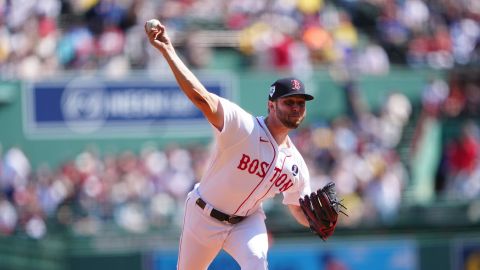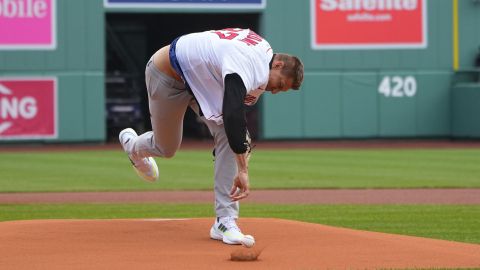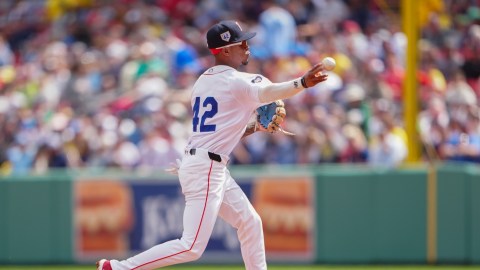It's been said that pitching and defense wins championships. No one really knows where that maxim came from, but at this rate, it could eventually be attributed to the Gospel of Theo.
With the widely reported imminent signing of free-agent third baseman Adrian Beltre — a move that comes on the heels of the Red Sox adding John Lackey, Mike Cameron and Marco Scutaro to what is already a playoff squad — the franchise is clearly following a plan that's been in place all offseason long.
To be fair, there wasn't much hitting to be had on the free-agent market this winter, especially that of the powerful variety. Aside from Jason Bay, who left Boston and agreed to a deal with the Mets, and Matt Holliday, who Tuesday re-upped with the Cardinals for $120 million over seven years, the Red Sox' top slugging options might have been less tantalizing names like Jermaine Dye or Russell Branyan.
And rather than shelling out top dollar for what they likely saw as less-than-bona-fide superstars in Bay or Holliday, Theo Epstein and the rest of the Boston brass decided to be thriftier with their money. But while they might get less bang for their buck — at least in terms of power hitting — the Red Sox might actually get more bang for their bucks in terms of production all over the diamond.
"They're always going to make moves," said new Met Jason Bay about the Red Sox at his introductory news conference on Tuesday. "They've got to keep up with the Joneses, so to speak. I think they have a brain trust of people up there that do a number of things. They know what they're doing. [The] Adrian Beltre [signing] went through, so they have a good idea of what's going on and they know what they have to do to compete in that division."
So what is it that they have to do?
Earlier this offseason, Epstein spoke about 2010-11 being a "bridge period," of sorts. “We still think that if we push some of the right buttons," he said, "we can be competitive at the very highest levels for the next two years. But we don't want to compromise too much of the future for that competitiveness during the bridge period, but we all don't want to sacrifice our competitiveness during the bridge just for the future."
"A bridge period?!" Red Sox Nation collectively gasped. How can we go from two World Series titles in four years to third-world nation, rebuilding status with the snap of Theo's fingers?
Hold up. It's not that dire.
A bridge period, in Theo's mind, refers to the period in a franchise's history between years of great teams capable of winning a title. With a young core of players already excelling at the major league level (think Kevin Youkilis, Dustin Pedroia and Jon Lester) and several more up-and-coming studs a season or two away from the bigs (your Casey Kellys, Ryan Westmorelands and Jose Iglesiases), 2012 or thereabouts could be the perfect storm for this group of Red Sox players. The established players will still be in their primes and the prospects will be ready to contribute.
So a bridge period doesn't mean that the Red Sox are giving up all hopes of winning until their current crop of youngsters is ripe.
It doesn't mean that the Red Sox won't spend money in the offseason. They certainly have, dropping over $110 million over the lives of the Lackey, Cameron and Scutaro contracts.
And it doesn't mean they won't be competitive. With unquestionably the best starting rotation in the majors and All-Stars from past and present littering their lineup, they'll be among the favorites to hoist the trophy next November.
What it seems Theo meant was that instead of going all-out to ink one or two superstar-level players to long-term deals, this would be a winter during which the franchise would be better off spending its money a bit more cautiously, finding the right short-term pieces to fit together into an almost-as-competitive puzzle.
This is seemingly where Adrian Beltre fits in. After deciding not to overpay for Bay or Holliday and realizing that it's going to take a crowbar to pry Adrian Gonzalez away from San Diego and new GM Jed Hoyer, Theo and Co. went looking for a shorter-term solution.
Well, where could the Red Sox look to improve immediately?
"Every time Theo asked me a question [about what I wanted] during the winter meetings, I would always say, 'A pitcher,'" manager Terry Francona said at the news conference introducing John Lackey to the Boston media. "Now we have a chance to run out a solid pitcher every day and it's very exciting."
How about defense? In 2009, the Red Sox ranked last in the majors — dead last — in total chances, assists and double plays and were second to last in Bill James' Defense Efficiency Ratio, which, to the layperson, is basically a measure of the number of balls in play that are then turned into outs by the fielders.
Enter Scutaro, Cameron and Beltre, all via short-term deals that will effectively bridge the gap until younger replacements are ready for the majors.
Tuesday night on SportsDesk, The Boston Globe's Amalie Benjamin suggested that Beltre is a bargain for one year at $9-10 million, especially given the defense he's likely to provide.
"There's no question," she said. "This is exactly the [kind of] deal that they like to do. … This is certainly a defensive move. This team is clearly looking at their defense as a huge priority for 2010. That's been drilled into our heads by Theo and by Terry. … This is a run-prevention situation with both Lackey and a lot of the people they've brought in defensively."
But it's not solely with the glove that Beltre could be an upgrade in 2010.
"I think [Beltre] could turn it around offensively," Benjamin went on to say. "He didn't have a very good year last year [.265, eight home runs and 44 RBIs in 111 games]. But his numbers overall? They aren't too bad. And I think the Red Sox are saying, 'Maybe we can get about the same we would get offensively if Mike Lowell were in that third-base spot.'"
It's a modest hope. It's not the sexy, superstar answer of an Adrian Gonzalez or a Miguel Cabrera, but it should be an improvement. And if the Red Sox can make minor improvements at several positions — and many would argue they have, particularly in their starting pitching, in the outfield and at third base — who's to say this team can't improve on its 95-win season in 2009?



